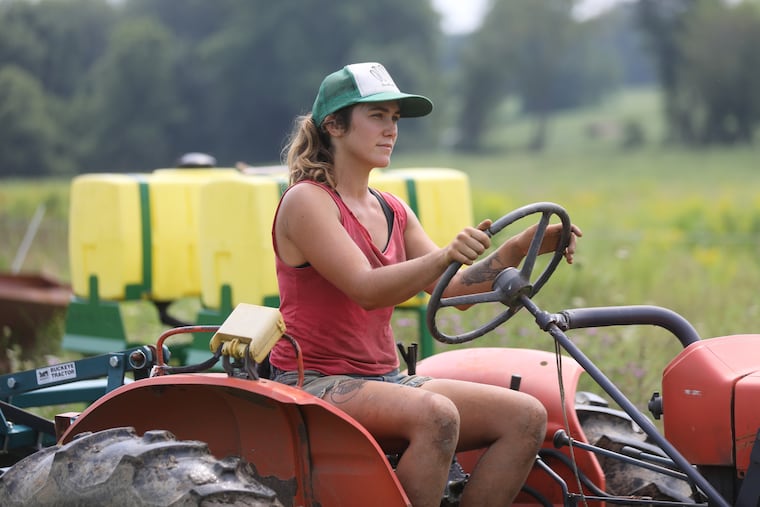Women find a foothold in the boys club of the agriculture industry
Men dominate the agriculture industry, but women have found their way in.

Skim the statistics or take a drive to see for yourself, but it's clear: Pennsylvania's farms are largely manned by men.
Of course, there are women on those farms, too, often seen working alongside their spouses. But there is a rarer sight: farms operated entirely — or almost exclusively — by women.
Emma Kelso Cunniff is one of those female farmers, as are Liz Wagner, Nancy McCann-Foy, Anita McCann-Hepler, and Lisa Plasters. Among them, the five women farm a wide array of crops and raise a few hundred animals between Pennsylvania's Lehigh County and New Jersey's Hunterdon County.
"I think having a farm run by women with an all-women crew can be inspiring for other women who are interested getting into agriculture," said Cunniff, owner and operator of Kneehigh Farm, a seven-acre Pottstown property she leases from Lundale Farm, a Chester County nonprofit.
Cunniff says — and statistics confirm — more women are beginning to farm, often in sustainable, smaller-scale agriculture. But farming is still largely a man's world.
"It's always very hard work," said Plasters, the owner and operator of Bella Nera Farm, a small produce and livestock operation in Milford, N.J. "And it's really empowering. I have a full-time job [in the pharmaceutical industry] as well, and it's hard. I don't have time in my life for anything else. This is a second job."
In Pennsylvania, 50,849 men and 8,460 women were listed as principal operators of a farm, according to the U.S. Department of Agriculture's statistics service, which drew from the 2012 agriculture census. In New Jersey, there were 7,239 male and 1,832 female operators. The majority of female farmers in both states are white, statistics show.
Across the country, the USDA recorded 969,972 women. That's 31 percent of the nation's farmers.
There's a lot to gain from female farmers, said Laura Perry Johnson, associate dean for the University of Georgia's Cooperative Extension. Their impact is calculated as $12.9 billion a year, according to the USDA, and they worked more than 300 million acres. But there are intangible qualities, too, Johnson says.
"Women bring a lot of unique qualities to agriculture as a whole — the ability to be very empathetic, and to understand certain situations," said Johnson, whose family has been farming for seven generations. "And I think it's important that the more diverse the people working in the field of agriculture are, the better ideas and better innovations are going to be brought around."
Some female farmers downplay gender at work — after all, they say, labor is labor, and they haven't experienced much sexism. But researchers say women play a distinctive role.
McCann-Foy and McCann Hepler, New Jersey sisters who run their family-owned McCann's Farm, have boosted their Elk Township farm by way of social-media savvy, scavenger hunts and tractor rides for kids, and even a YouTube channel where the sisters regularly video-blog about their lives as farmers. (The channel boasts a subscriber count of more than 106,000 viewers.)
McCann's Farm, at 1065 Aura Rd. in Monroeville, has a different feel to it now that the sisters say they've allowed it to exist as a community space where children and their families can come visit, pet livestock, or, in the spring, go hunting for Easter eggs.
The siblings, whose husbands also help out with the farm, are modest about it all.
"We're just two chicks farming in South Jersey," said McCann-Foy, 47.
Whether they intended it or not, "woman-run" is one of the brands the McCann sisters have created for themselves.
It's also the reputation that Cunniff, of Kneehigh Farm, has grown for her business. Her Instagram page, which has attracted more than 10,000 followers, touts "women-run" in its description.
Sitting at a wooden picnic table at her farm, Cunniff clarifies — with a laugh — that she's not "anti-man."
"It's not just a marketing point, but a goal of the business to empower other young women in farming," said Cunniff, 27, who works with two other women at her farm. "And I feel that's one of the most rewarding things for me, too — having an all-women crew, and we all feel comfortable enough to fail, or to try different things, to be strong, to drive a tractor."
For whatever reason, Cunniff says, she's never received an application to be a farmhand from a man. She's not entirely sure why. Although she promotes a woman-run operation, she says jobs are open to all.
When Wagner has attended agriculture conferences, she's heard other women report issues of hiring men who wouldn't take them seriously, or men who explained how things should be done.
"So you'd have that push-and-pull," said Wagner, the operator of Crooked Row Farm in New Tripoli, Lehigh County.
More commonly, Wagner says, she's received thoughtless questions.
"There are plenty of times I've been at markets or events and people are like, 'Where's your husband?' or 'Oh, you work on the farm?' " Wagner said, sitting at her family's produce stand off Route 309 in Orefield. "And at some point you just roll your eyes. It's a silly thing, but you adjust to that."
Cunniff says she's received similar types of questions.
When it happens, she politely corrects them.
"It's so subtle in this environment," Cunniff said. "We're so hesitant about being politically correct with that — the men's role, the women's role. But those roles kind of play into our everyday life. They're there, and we're fighting them and it's an interesting struggle. … And how can we, in little ways, change them?"